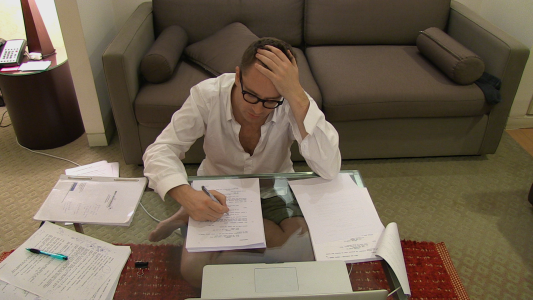Fri 27 Feb 2015
The Hunting Life
Posted by admin under Film Review
Comments Off on The Hunting Life
A pair of documentaries are opening in theaters this week that represent two distinct non-fiction narrative forms. Kirby Dick and Amy Ziering’s The Hunting Ground is a journalistic piece that attacks a major news story from a myriad of angles. Liv Corfixen’s My Life Directed by Nicolas Winding Refn is a personal essay that happens to be “written” with a camera. Both films have the individual strengths and weaknesses, but viewed alongside each other, they speak to the wide range of stories that exist to be told in the documentary genre, not to mention the different ways of telling them.
Let’s start with The Hunting Ground, a sequel of sorts to Dick and Ziering’s last film together, The Invisible War, which documented some of the people behind the depressing statistics of rape within the American military. The Hunting Ground explores the same subject in a different environment: college campuses. It’s territory that has been explored in the news quite a bit recently, especially in the wake of a discredited Rolling Stone article that attempted to draw attention to this vitally important subject, but instead became the subject of the story when it became clear that the reporting methodology was deeply flawed.
Unlike the writer of the Rolling Stone piece, the Hunting Ground filmmakers have been more careful in their reporting, offering up story after story that paints a troubling picture of how educational institutions across the country respond to crimes that occur on their campuses. The crime of rape itself is terrible enough—what compounds the tragedy is the lackluster response on behalf of administrators, who are often quicker to discourage (and, in some extreme cases, discredit) the victims than aiding them in seeing the perpetrator brought to justice. Where the Rolling Stone article was constructed around one woman’s story—a choice that ultimately proved problematic when that story turned out to have several crucial discrepancies—The Hunting Ground incorporates many stories. And while the circumstances and colleges change, the general sequence of events remains the same from narrative to narrative, which comes together to form a troubling pattern that demands to be addressed.
Truth be told, there were times watching The Hunting Ground where I wondered whether the filmmakers wouldn’t have been better off limiting the number of women they profiled to three or four, just so the audience gets a fuller sense of the details surrounding each specific case. There are certainly individuals in the film who could support their own documentary, most notably Andrea Pino and Annie Clark, rape survivors who filed a Title IX lawsuit to protest colleges’ treatment of victims. Dick and Ziering also secured the participation of Erica Kinsman, who was at the center of a widely-publicized case involving college football quarterback Jameis Winston, a star athlete his institution (Florida State University, for the record) fairly egregiously tried to protect. Again, the collusion between academics and athletics at major universities is a subject that’s almost better served as a standalone film instead of being just a small part of this one.
But the more I think about it, the more I see the logic behind the filmmakers’ approach: they’re cast their net wide as a means to present the enormity of the problem in the hopes it will make viewers—and maybe more than a few colleges—sit up and pay attention. The Hunting Ground directly and, at times, bluntly argues its case, appealing directly to the audiences’ sense of moral outrage. It’s a more rigorous bit of journalism than the Rolling Stone story and, thus, is likely harder for colleges to rebut. The fact that so many of the universities mentioned in the film have opted to stay silent (most declined requests to make administrative officials available for interviews) speaks volumes.
Although their feelings about the subject are quite pronounced in the film, Dick and Ziering keep themselves from entering the frame. Not so with Liv Corfixen, who is a regular presence during My Life Directed by Nicolas Winding Refn—even when she’s not onscreen, the viewer is distinctly aware that she’s wielding the camera. That’s understandable given that it’s her life and husband being referenced by the title. Refn, of course, is the Danish director who directed a series of critically-acclaimed (but little seen) European art films until he hit the commercial jackpot with Drive, a Ryan Gosling star vehicle that became a modest international sensation. My Life is filmed during the making of Refn’s second collaboration with Gosling, Only God Forgives, a 2013 Thailand-set curiosity that’s more in line with the brutal, esoteric pictures he was making before Drive. The knowledge that’s he’s going from something extremely commercial to something extremely un-commercial isn’t lost on the director, who alternately boasts about that for his wife’s camera or meekly puts it out there as if seeking her approval.
If you’re going into My Life actually expecting to learn about Corfixen’s life, be prepared to be disappointed, as the film is focused on the making of Only God Forgives to the exclusion of almost anything else. That’s almost certainly part of the point; there are a few stray lines in the film where she points out to Refn that his career has become the focal point of their marriage, compelling her to move to Thailand along with their children so they wouldn’t be separated for a prolonged period as time as they were with Drive. So for better and for worse, her life as become an extension of his—even this documentary is almost more for his benefit, allowing Refn’s fanbase to watch over his shoulder as he pals around with Gosling in between takes and choreographs sequences of brutal violence. Moments like this keep My Life—which clocks in at a swift 58 minutes—from ever getting dull, but it is fairly thin stuff, as Refn faces few challenges in the production of Only God Forgives beyond his own self-doubt and Corfixen refrains from revealing too much about herself to become an interesting presence. On the other hand, it does make me want to give Only God Forgives, which I panned the first time around, another look.



No Responses to “ The Hunting Life ”
Sorry, comments for this entry are closed at this time.